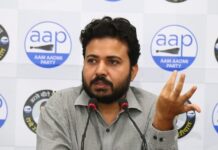 The All-Party Parliamentary Group on Indian Traditional Sciences celebrated Ayurveda Day at a packed meeting in Houses of Commons on Monday 12th November. The predominant message was that Ayurveda is a proven, effective, comprehensive system of medicine, and needs to be made accessible to all in this country, supported by the National Health Service.
The All-Party Parliamentary Group on Indian Traditional Sciences celebrated Ayurveda Day at a packed meeting in Houses of Commons on Monday 12th November. The predominant message was that Ayurveda is a proven, effective, comprehensive system of medicine, and needs to be made accessible to all in this country, supported by the National Health Service.
Amarjeet Bhamra, Secretariat of the APPG, welcomed the 100 guests to the meeting, pointing out that this was the third annual celebration of Ayurveda Day to have taken place in the UK Parliament. With the aim of integrating Ayurveda into the National Health Service as a prevention oriented, natural and cost-effective healthcare system, an Early Day Motion (see below) had been tabled and all Members from both Houses of Parliament were invited to support it. The public were also invited to write to their MP urging them to lend their support.
In his opening remarks as Co-chairman, Bob Blackman, MP for Harrow East, reminded everyone of the 6,000-year-long tradition of Ayurveda. On the basis of its longevity alone, Ayurveda had clearly shown that it had been time tested and therefore merited inclusion with the NHS. He warmly welcomed David Tredinnick, MP for Bosworth, a long-standing supporter of Ayurveda and chairman of the APPG for Complementary and Alternative Medicine, together with Geoffrey Van Orden, MEP for the East of England, who is hosting an Ayurveda Day celebration in the European Parliament on 21 November.
He remarked, that in a meeting with Simon Stevens the head of NHS England that clear benefits are to be had from Yoga and wellness programmes. We are pushing an open door. ‘If it’s been in use for 6000 years, it can’t be that bad’!
The opening address was given by the Acting High Commissioner of India to the UK, His Excellency Mr. Charanjeet Singh, who spoke about the prevention-oriented approach of Ayurveda, and the steps taken by his government to promote Ayurveda in the UK and around the world, in particular the inauguration of a Centre of Excellence for Yoga Research and Indian Traditional Medicine in the UK earlier this year, at a ceremony with both Prince Charles and the Prime Minister of India, Narendra Modi. Nature had everything ready for us when we eventually came to this planet, say 10 thousand years ago. Mentioned WHO and the major diseases where huge money is being spent for the metabolic diseases and cancer, affecting 30 million people a year.
Ayurveda can offer solutions here. It is not a medical system in fact, but an overall wellness-oriented system and should be integrated alongside Allopathy, minimizing health-care costs, he said.
Dr Tony Nader, MD PhD, Neuroscientist and Vedic scholar and Head of the International Transcendental Meditation and Maharishi AyurVeda organisations, highlighted one fundamental but often ignored element of Ayurveda – consciousness. In the past in scientific circles, consciousness was always regarded as ‘all or none’, in other words consciousness is either present or absent (as in coma or in altered states of consciousness). However, in recent years there has been more awareness of the possibility of enhancing one’s level of consciousness. The science of psycho-immuno-neuroendocrinology understands more and more how the physiology is influenced by the mind and by the mental experiences that we have. And this aspect of consciousness is our specialty. Over 600 scientific research studies have documented highly significant benefits to health and mental functioning, from the practice of Transcendental Meditation which systematically gives the experience of the most unified level of consciousness, transcendental consciousness. He made this contribution by Skype from the USA.
Dr Nader invited governments to take note of the extraordinary benefits of Transcendental Meditation which can prevent many of the prevalent social problems, including problems of violence and war. Techniques have been under study for more than 60 years along with TM; 600 studies show effectiveness in all areas of health, prevention, longevity, B.P. and metabolic diseases. Here we are also talking about tools that with the compound of all the Traditional Indian Sciences, behavioural patterns will also be improved, helping to deal with the evolutionary processes. He thanked Amarjeet for bringing Ayurveda to the population of the world! Together with the government of India and the technology available in the UK, Indian Traditional Sciences will come into being.
Vidhi Sadana a Yoga therapist who has been working closely with Dr Bernard Culaço at the Central Middlesex Hospital on a pilot study looking at rheumatology patients. She spoke about this study and about the general approach of yoga therapy which incorporates principles of Ayurveda. Yoga therapy involves yoga exercise to target specific conditions or specific patients. One of her patients then spoke eloquently of the profound benefit she had received from yoga therapy under the guidance of Vidhi Sodhi.
Prof. Madden Thangavelu of Cambridge University mentioned that in Belgium where he has been working, one in four teenagers describe themselves as suicidal. This terrible statistic highlights the need for governments to adopt urgently Ayurveda’s prevention-oriented approach to mental health. Madan also noted that India with a population of 1.5 billion spends £6.2 billion on healthcare, compared with the UK’s £150 billion for only 60 million population. He felt that Britain could learn something from India’s more economical approach.
Shahnaz Husain, producer of Ayurvedic health and beauty care products, spoke of the value of simple Ayurvedic remedies. She described how triphala had restored her mother’s sight, and how a patient had recently been passed to her, a young man also suffering from loss of sight, and again she had used triphala with great success to heal his condition. She said succinctly: ‘We need to go back to nature, and Ayurveda is the only answer for this.’
Ragasudha Vinjamuri Bharatanatyam dancer explained and mimed the origins of Ayurveda, when the ocean was churned and both nectar and poison came out. She added that the Dhanvantari oath is taken by all Ayurvedic doctors just as the Hippocratic oath is taken by western doctors.
Selena van Orden, 5th year student at College of Ayurveda UK in Milton Keynes, appealed eloquently for the NHS to urgently incorporate the Ayurvedic approach to prevent disease. Ayurveda understands six stages of disease, she said, the first three of which are present before any symptoms have manifested and are thus unknown to modern medicine. Treating these early stages of disease can prevent the disease from ever manifesting, and could thus save the NHS billions. It was time for patients to take charge of their own health, she said.
A special guest was Prof. Kaviraja Harishankara Sharma, now in his nineties but with the energy and vigour of someone half his age. He is teaching in Japan, and also researching Ayurvedic mineral preparations in collaboration with a professor of medicine there. He urged those present to start a similar research programme in the UK.
Prof Dilip Acharya, referred to studying plants for nearly thirty years. Dilip described his work to maintain and preserve plants that are in danger of becoming extinct.
Dr Shrikanthbabu Perugu, Professor at the Ayurveda College in Hyderabad, India who has five colleges graduating 92 postgraduate students annually and who has personally treated 400,000 people, described his success in three areas of health: Lower back pain, where a special basti (enema) devised by him has reduced the cost of treatment by 70%; Muscular dystrophy, where CPK levels have been reduced; ADHD in children, using a simple external treatment that is found to settle the child down.
Dr. Prabhu, paediatrician from St Mary’s Hospital, London, called for more work to draw parallels between Western medicine and Ayurveda.
Dr. Shantha Godagama, founder of Ayurveda in the west, described his mission to protect Ayurveda from misuse, and his second mission to bring it into the mainstream of the NHS. In spite of the fact that the majority of people in the UK want access to herbal medicine, Ayurveda is currently not funded by the NHS and remains in the private sector, to which only the richer people have access. Objections to the inclusion of Ayurveda centred on quality control on products from India and Sri Lanka and he urged the Acting High Commissioner to begin a dialogue with British authorities to align production standards in India to those in Britain.
Dr Ravinder Kaur an Ayurveda doctor from Ireland since 2007 said that when she arrived there, the Irish had no idea even what turmeric or ginger was! Prevention strategy should be thought through for personalised approach and integration in schools and the health system. Through education and giving people back control of their health then our children will live longer and happier lives as well as many problems with depression and anxiety.
Stephan Hein spoke of awe is a quality of life that we have lost. Consciousness awareness and spirituality can only be expressed through Ayurveda. Working with the Hale Clinic in London which specialises in complementary medicine, he spoke of the need to promote the consciousness aspect of healing, as had Professor Nader at the beginning of the evening.
Susan Cooper came through vibrantly as the last speaker and referred to Deepak Chopra her teacher. Three years ago, she decided to set up a mass movement convening over 600 people for meditation. She invited the august gathering to support her next event scheduled for May 11, 2019.









